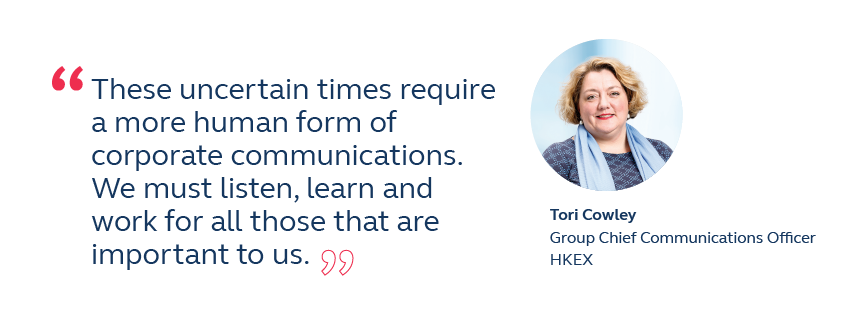By Tori Cowley, Group Chief Communications Officer, HKEX
The corporate world is undergoing a period of breath-taking change, and it often feels like there is little time to take stock or to digest. With the relentless march of technology, 24-7 culture, and the heightened political, economic, and competitive landscape as our backdrop, building and protecting a corporate brand has become more complicated and fraught with risk than ever before.
We are living in unprecedented times being shaped by a global health crisis, geopolitical tensions and economic fragility. In the current environment, corporates can find themselves investing their energy in managing and responding to issues, crisis and bad news. However, successful organisations need to carve out time to proactively tell their own stories. Companies need to be the master of their own engagement despite the noise.

More recent expectations of corporates add to this complexity - sustainability, diversity, climate change, shareholder activism, philanthropy, flexible working, community engagement - issues that responsible corporates are expected to have a position on, and programme for. Finding the right balance between these diverse interests is a science and an art. Recently it has become clear that these challenges have overwhelmed some organisations, and have been caught on back foot, but it doesn’t have to be that way.
Stay on your front foot
As a market operator, regulator and a listed corporate, at Hong Kong Exchanges and Clearing (HKEX) we have a broad group of stakeholders, often with competing values, objectives and priorities despite their obvious intersect. Therefore, it is our job to engage with as many members of our communities as we can, from employees to clients, regulators to competitors, critics to fans. It is only through doing this that we can find that elusive balance.
In a world where everyone’s opinion matters, in a time when crises seem to happen with greater frequency, it is more important than ever to shape your own agenda, and define your own engagement. Only by listening and truly embracing the concept of diversity can an organisation succeed in the long-term. So rather than just respond to what the world throws at you, corporates must communicate their purpose, narrative, message, belief, and values. This communication must be aligned to your business, and done in an authentic and considered way. Not just to create the headlines of this week, but to build the trust and authority that are the bedrocks of reputation. Reputation is not owned by the corporate, but rather it is shaped by those external to the organisation. You just have to feed it.
Long-term proactive stakeholder engagement is critical. When done right, it helps build a bank, or inventory, of trust in preparation for when a crisis hits. It creates a level of protection against the short-term shocks of reputational damage. Building public trust is a long game that plays out over years. An ill-advised tweet or slow reaction to a developing situation can still damage a reputation, but long-term proactive stakeholder engagement can help mitigate the magnitude of short-term negative impacts.
Make engagement a two-way street
Effective stakeholder engagement will be different for every company, but there are some commonalities. Firstly, know your stakeholders and their expectations, and be authentic and accountable to them. If you don’t know them, or what they expect of you, ask them. Humbleness goes a long way in building trust.
Actively listen to your stakeholders, and then respond to them in a timely and considered way. Credibility is under attack on all fronts, and therefore providing a wide set of proof and data points for your responses is important.
Work to build a two-way dialogue, rather than simply broadcasting your marketing messages. Listening does not show weakness, but strength. Show that you have listened to and heard what is said, and incorporate those ideas into your responses and actions.
Be clear in what your company represents and what value you bring to the community. A company builds connectivity and relevance by clearly communicating its purpose.
Be brave. Don’t follow the pack. Good companies carve out their own path.
These uncertain times require a more human form of corporate communications. We must listen, learn and work for all those that are important to us. Engagement is the way we can show that we are here for the long-term, that we want others to be part of our success.
Credit: This article first appeared in Telum on 23 June, 2020